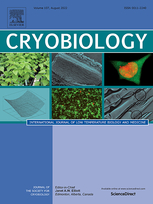
L'effet du refroidissement sur la mobilité et les fonctions physiologiques des spermatozoïdes humains.
Effect of cooling on the mobility and function of human spermatozoa.
Auteurs : CHANTLER E., ABRAHAM-PESKIR J. V., LITTLE S., et al.
Type d'article : Article
Résumé
Human spermatozoa were cooled from 37 to 0 °C at 10 °C/min in 5 °C steps with 1 min equilibration at each step. Spermatozoa were held at 0 °C for 5 min and then rewarmed at the same rate. No significant effect of cooling on the straight-line velocity was found using computer-aided semen analysis. The physiological function of spermatozoa was examined before and after cooling using hypoosmotic swelling, ionophore-provoked acrosome reaction, and binding to fragments of human zonae pellucidae. When spermatozoa were cooled and rewarmed in seminal plasma there was no significant change in either the ionophore induced-acrosome reaction or the binding to zona pellucida fragments. When spermatozoa were fractionated by centrifugation through Percoll an increased response in both was seen. However, following cooling and rewarming, a significant decline in the response of both occurred. Mobility alone is thus not a reliable predictor of changes in other physiological functions of spermatozoa following cooling. Furthermore, short-term cooling appears to have no significant detrimental effect and cold shock may be avoided in the clinical context by controlled cooling and warming.
Détails
- Titre original : Effect of cooling on the mobility and function of human spermatozoa.
- Identifiant de la fiche : 2001-2513
- Langues : Anglais
- Source : Cryobiology - vol. 41 - n. 2
- Date d'édition : 09/2000
Liens
Voir d'autres articles du même numéro (1)
Voir la source
Indexation
- Thèmes : Influence du froid sur les cellules, tissus et organes
- Mots-clés : Sperme; Propriété physiologique; Cryobiologie; Refroidissement; Homme
-
Caractéristiques physiologico-biochimiques de j...
- Auteurs : SAVUSHKINA S. I., ANAN'EV V. I.
- Date : 1991
- Langues : Russe
- Source : Rybn. Hoz. - n. 12
Voir la fiche
-
Intermittent whole-body cold immersion induces ...
- Auteurs : SOLIANIK R., SKURVYDAS A., MICKEVICIENE D., et al.
- Date : 10/2014
- Langues : Anglais
- Source : Cryobiology - vol. 69 - n. 2
Voir la fiche
-
Gender-specific cold responses induce a similar...
- Auteurs : SOLIANIK R., SKURVYDAS A., VITKAUSKIENE A., et al.
- Date : 08/2014
- Langues : Anglais
- Source : Cryobiology - vol. 69 - n. 1
Voir la fiche
-
Use of sperm stored under hypothermic condition...
- Auteurs : GRISCHENKO V. I., PETRUSHKO M. P., PINYAYEV V. I., et al.
- Date : 07/2001
- Langues : Anglais
- Source : CryoLetters - vol. 22 - n. 4
Voir la fiche
-
Physiological, biochemical and molecular charac...
- Auteurs : SKYBA M., URBANOVA M., KAPCHINA-TOTEVA V., et al.
- Date : 05/2010
- Langues : Anglais
- Source : CryoLetters - vol. 31 - n. 3
Voir la fiche
